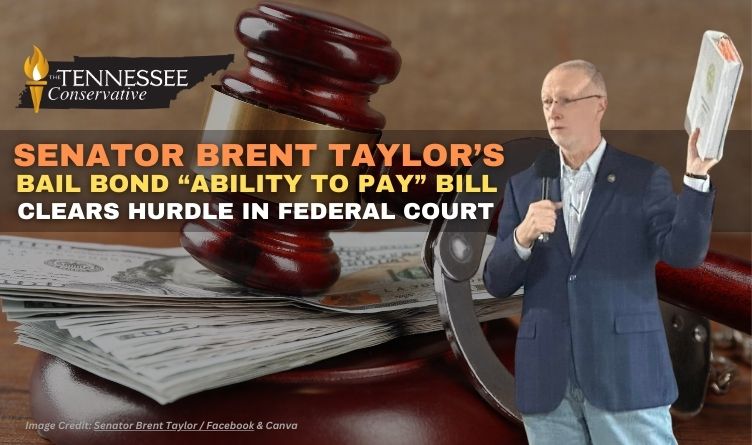Image Credit: Senator Brent Taylor / Facebook & Canva
The Tennessee Conservative [By David Seal] –
Senator Brent Taylor (R-Memphis) was tired of seeing liberal judges release suspects of violent crime based on their ability to pay bond fees and not take into consideration the safety of the community.
He persuaded his fellow legislators in the Tennessee General Assembly to enact laws to address each issue. Senate Bill 2562 became Public Chapter 612, requiring judges to first consider the “safety of the community” when setting bail amounts.

Another bill, Senate Bill 2565 which became Public Chapter 869 in May 2024, prohibits judges from considering a suspect’s “ability to pay” when setting bail amounts.
The “ability to pay” law is being challenged in federal court.
Taylor drafted the “ability to pay” bill so that any bonehead could understand it, telling Action News 5 in Memphis, “That standing bail order was written in two languages,” …..“It was written in English and stupid. To take a criminal defendant who’s been arrested and put in jail and then basically ask him how much money he happens to have in his pocket, and that’s how you determine bail…is insane. It’s crazy.” -said Senator Brent Taylor
Before the ink dried on Governor Lee’s signature on the “ability to pay” law, the ACLU and other organizations filed suit to stop it on constitutional grounds. An organization called Just City had filed a request for a preliminary injunction to suspend the law until the case could be permanently decided by the federal district court.

That request made by Just City for preliminary injunction and expedited declaratory relief and a second Motion to Dismiss, made by the State of Tennessee and other defendants, were denied on November 29, 2024, by United States District Judge Thomas L. Parker, clearing the way for the “Ability to Pay” law to stay in effect until the case is finally decided.
The court stated in part in its conclusion to the ORDER DENYING PRELIMINARY INJUNCTION AND MOTIONS TO DISMISS, “Just City has not shown that the Tennessee statute is likely unconstitutional or that it likely has standing to bring the action. On balance, the Court finds that it should not employ the strong remedy of a preliminary injunction here……Even though these challenging questions do not support preliminary injunctive relief, Just City has alleged enough to survive a motion to dismiss.”
The full text of the federal court order is linked HERE.

On a related matter, Taylor is fighting on another front to protect his constituents from violent crime. His battle with Shelby County General Sessions Court Judge Bill Anderson continues after a formal public reprimand was issued against the judge by the Tennessee Board of Judicial Conduct. (TBJC) If Anderson gets another reprimand, he could be removed from the bench by the legislature.
Taylor has already called for Anderson’s suspension from the bench.
A copy of the TBJC reprimand is pictured below.


About the Author: David Seal is a retired Jefferson County educator, recognized artist, local businessman, 917 Society Volunteer, and current Chairman of the Jefferson County Republican Party. He has also served Jefferson County as a County Commissioner and is a citizen lobbyist for the people on issues such as eminent domain, property rights, education, and broadband accessibility on the state level. David is also a 2024 winner of The Tennessee Conservative Flame Award & has received an accolade from the Institute For Justice for successfully lobbing the TN legislature to protect property rights. David can be reached at david@tennesseeconservativenews.com.



2 Responses
Smart. Memphis is the # 1 Most dangerous City in the U.S. Google that and you will see.
GOOD. He’s DEFINITELY in the minority in lucifer’s dimmercrap Memphis. The voice of sanity.